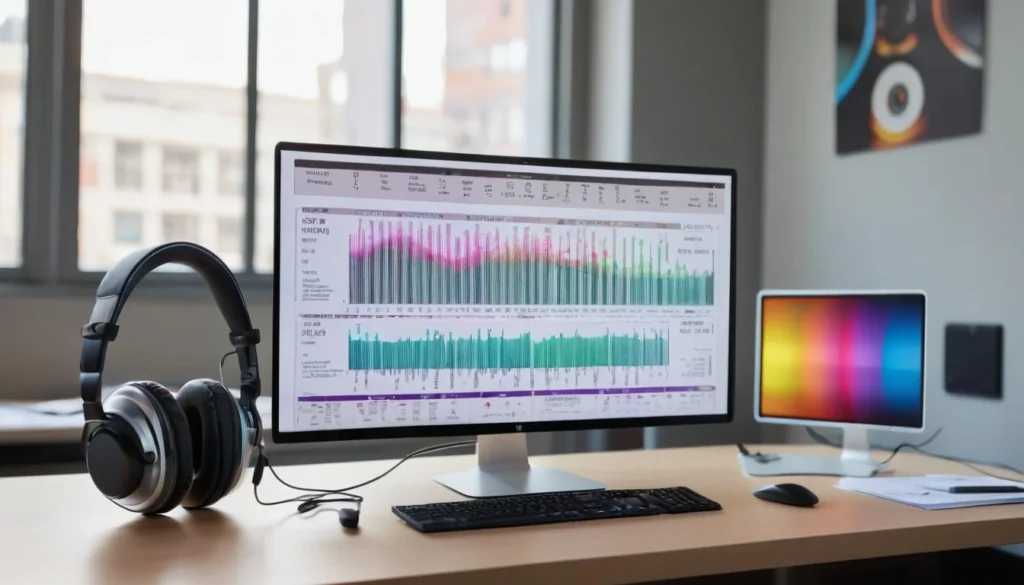Hearing Test Online: Quick, Easy, and Accurate Assessment
Feeling unsure about your hearing health can be unsettling, especially when it affects your favorite activities like enjoying a good mystery novel in peace. Do you think you need hearing aids to better hear speech? Do you have a hearing impairment? Those are just the possible questions running through your mind when you experience signs and symptoms of hearing loss.
Fortunately, online hearing tests provide a straightforward solution for quickly assessing your hearing from home. They offer immediate feedback without the need to schedule an appointment with a hearing care professional.
What makes these tests particularly appealing is their accessibility. You can get your very own hearing test results without leaving your location. This early step not only saves time but also helps identify whether follow-up with a hearing care specialist is necessary, thus blending seamlessly into your routine while providing significant insights into your auditory wellness. As we dive deeper into this topic, it becomes clear how these online assessments work and why they are gaining popularity.
An online hearing test is a convenient assessment tool that allows individuals to check their hearing ability from the comfort of their own homes using standard headphones or earphones. This type of test typically takes only a few minutes and provides users with a preliminary evaluation of their hearing health, while encouraging them to have a consultation with a healthcare professional for comprehensive evaluation.

Purpose of Online Hearing Tests
Online hearing tests are designed to provide a quick and convenient way for people to check their hearing ability from the comfort of their own home. They are typically used as a preliminary screening tool to identify potential hearing issues. While these tests can give a basic indication of whether someone has difficulty hearing certain sounds, they are not as accurate as a full hearing evaluation performed by an audiologist.
The primary purposes of online hearing tests include:
- Early Detection: They help people recognize possible hearing problems early on, prompting them to seek professional care if needed.
- Convenience: Online tests offer an easy and accessible way to check hearing without visiting a clinic.
- Awareness: These tests can raise awareness about hearing health and encourage people to take better care of their hearing.
- Preliminary Screening: While not a substitute for a professional test, they can give users a general idea of their hearing ability, especially if they notice changes over time.
However, for a comprehensive and accurate diagnosis, it’s important to follow up with an audiologist for a full evaluation.
Benefits of an Online Hearing Test
One of the most significant advantages is definitely convenience. Imagine being able to assess your hearing without having to schedule an appointment or travel to a clinic for an audiogram. You can take the test at home and get a baseline diagnosis, perhaps while enjoying a cup of coffee or in your favorite comfortable chair. This accessibility is particularly beneficial for those who face mobility issues or live far away from traditional audiology services. For many, the prospect of visiting a healthcare office can be daunting, especially if transportation is a barrier.
Beyond convenience, these tests shine in delivering quick results of a hearing evaluation.
Many online platforms are designed to provide instant feedback, allowing users to receive preliminary results and details within a mere 5 to 10 minutes. According to research from the National Institute on Deafness and Other Communication Disorders (NIDCD), this rapid response time has been linked with encouraging individuals to pursue a professional hearing check sooner rather than later. Having immediate insight into one’s hearing ability fosters a proactive approach to health care, ensuring that potential issues are addressed promptly by professionals.
Another appealing aspect of online hearing tests is their cost-effectiveness.
Unlike traditional testing methods, which may involve higher charges associated with a visit to an audiology clinic, most online hearing tests are either free or available at a nominal fee. This price point opens up these vital assessments for a broader audience, encompassing individuals who might otherwise have not considered checking their hearing due to financial constraints. This level of access ensures that more people can get support and prioritize their auditory health without overextending their budgets.
Understanding these benefits sets the stage for exploring the operational mechanisms behind these effective diagnostic tools, shedding light on what makes them so user-friendly and accessible in everyday life.
Types of Online Hearing Tests
There are several types of online hearing tests, each designed to assess different aspects of your hearing. While these tests are not as accurate as in-person evaluations by an audiologist, they can give a general idea of your hearing ability. Here are the common types of online hearing tests:
- Tone-Based Hearing Tests: These tests play a series of tones at different frequencies and volumes to see if you can hear them. They help identify potential hearing loss in specific frequency ranges.
- Speech-in-Noise Tests: This test checks your ability to understand speech in background noise. You listen to words or sentences being spoken over different noise levels and are asked to repeat what you hear.
- Questionnaire-Based Tests: These tests ask a series of questions about your hearing in different situations. Based on your answers, the test estimates the likelihood of hearing loss.
- Pure Tone Audiometry Simulations: Similar to what’s done in a clinical setting, this test uses a range of tones at varying pitches to see the quietest sound you can hear at different frequencies.
How Online Hearing Tests Work
Conducting an online hearing test is an efficient and user-friendly experience designed to give individuals quick insights into their hearing health.
First off, proper initial setup is crucial. Users need access to a laptop or smartphone with a stable internet connection and a decent pair of headphones for optimal sound quality. The test often begins with a calibration to verify volume levels within the application. Think of it as a trial and error stage.
This is followed by ensuring that the environment is free from noise disruptions. Avoid noisy or windy locations because it might affect the way you hear sounds during an online hearing test. A quiet space helps to achieve the most accurate acoustic results possible, as background sounds can significantly interfere with the test.
After the initial setup, the next step involves answering several preliminary questions regarding your hearing health history. This step is particularly important because it allows the system to tailor subsequent tests based on your individual needs. It might seem trivial at first, but these questions help to construct a clearer picture of the area of your auditory capabilities and any previous issues you might have encountered.
Navigating through this part carefully means you’re giving the system enough information to make accurate assessments.
Moving forward, sound tests are initiated, consisting of a series of tones or recorded spoken words played at various frequencies, decibels, and volumes. You’ll be asked to identify these sounds by clicking on designated on-screen buttons when something resonates with your hearing capability. This interactive approach not only keeps users engaged but also allows for real-time responses, vital for assessing hearing sensitivity across different sound frequencies and threshold.
One significant aspect of this process is the speed with which results are generated after completing the test.
Immediately upon finishing, users receive a summary report outlining their hearing ability. The content of the assessment indicates whether their hearing is within normal range or not. This prompt feedback empowers individuals with knowledge about their hearing status and informs them if they should consider seeing a professional for further evaluation. Notably, such immediacy in reporting satisfies curiosity and plays a critical role in motivating users to take necessary action regarding their hearing health.
As we consider how essential it is to understand those results, let’s examine how accuracy plays a pivotal role in interpreting them effectively.
Accuracy of Measuring Results

The accuracy of online hearing tests indeed plays a pivotal role in determining their reliability. While they offer convenience and prompt results, it’s essential to put a disclaimer that they don’t completely replace the rigor of professional assessments performed by audiologists. One of the key debates revolves around whether these tests can deliver results that one can truly trust, given that various factors can influence outcomes.
Technical Limitations
Technical limitations significantly shape the accuracy of these online tests. For instance, using subpar headphones—or even regular speakers—can result in distorted sound frequencies. This distortion skews the user’s ability to respond accurately during the test. Imagine taking a music quiz with poor-quality earbuds; you’d hardly catch the nuances of different sounds, let alone assess your hearing across various frequencies.
Furthermore, the testing environment matters too; a voice of somebody passing by, noise from nearby conversations or traffic can interfere with sound level and sound clarity, disrupting your focus to a certain degree.
To ensure better accuracy, it’s advisable to use high-quality headphones in a quiet environment, as this maximizes your ability to hear subtle differences in pitch.
Research Findings
When examining the effectiveness of these platforms, research reveals intriguing insights. According to findings published in the Journal of Audiology, online hearing tests boast an accuracy rate ranging from 75% to 85% when compared to standard clinical audiometry tests. However, variations in results occur based on the specific platform used and the quality of equipment at the user’s disposal. As such, while many online platforms can provide valuable preliminary insights into auditory health, they often fall short of providing a complete picture of someone with hearing loss.
Given this variability, individuals should approach their online test results with informed caution. It’s highly recommended to take any concerning results seriously and proactively seek additional evaluations from a qualified audiologist for definitive diagnoses. An audiologist can lay out different recommendations for personalized treatment of patients with hearing loss.
User Experiences
Personal testimonials further underscore the value these online assessments provide in prompting users toward action regarding their hearing health. For example, Jane Doe from New York shared her experience: “The online test was a wake-up call. It showed I had moderate hearing loss which was later confirmed by an audiologist.” This links to how an accurate initial screening can motivate individuals to address their hearing concerns before they progress further.
While these online tests are useful tools for raising awareness about hearing health, recognizing what they can’t fully achieve is vital for taking appropriate next steps in care and assessment.
Limitations to Consider
While online hearing tests can provide insight into your hearing capabilities, it’s important to recognize that they have a number of boundaries and limitations. One significant limitation lies in environmental factors. The presence of background noise can severely impact the accuracy of the results. For instance, if a test is taken in a bustling café or a room with significant traffic noise, even subtle sounds that are not necessarily disturbances may interfere with the clarity of the tones and frequency you’re meant to hear during the assessment.
It’s akin to trying to listen to your favorite song when your friend is continuously talking; that distraction can lead you to miss nuances.
Hardware Variability
Another critical point of concern is hardware variability. The quality of the device used for the test makes a profound difference. Different headphones or speakers reproduce sound differently. What might seem perfectly clear through high-end headphones could sound muted or indistinct on a standard pair meant for casual listening. Thus, using budget headphones causes possible skew test results significantly and leads to misinterpretations of your hearing capabilities.
Imagine having an orchestra playing beautifully but listening through a tin can; you’re missing out on so much detail.
Professional Diagnoses
Lastly, it’s vital to consider that online tests lack the capacity for professional diagnoses. They serve as preliminary assessments rather than definitive medical evaluations. Other types of hearing conditions, like middle ear infections or other auditory processing disorders, cannot be identified through an online screening tool alone.
For instance, those persistent ringing noises (tinnitus) in your ears or sudden changes in hearing should be discussed with a healthcare provider who can conduct thorough evaluations and recommend treatments if necessary.
Understanding these limitations helps underscore the necessity of combining online assessments with professional oversight. This holistic approach ensures a thorough understanding of your hearing health while addressing any potential concerns effectively.
By getting a professional hearing test, an audiologist would best know if you need a hearing aid, assistive listening accessories, or other products and solutions to improve your hearing.
Integrating Online Tests with Professional Care
There’s no question about the accessibility and convenience of online hearing tests. The service that online hearing tests provide should indeed be viewed as a valuable complement to traditional professional evaluations. They provide a convenient starting point for individuals concerned about their hearing abilities, helping them quickly gauge whether they might need further assistance.
For instance, these tests can function as an initial screening tool, allowing users to address potential issues early on. If the numbers indicate that there might be a hearing loss, it becomes crucial to schedule an appointment with a licensed audiologist. This step ensures that a thorough examination is performed, using sophisticated equipment and expertise that cannot be replicated at home.
Regular usage of online tests plays an essential role in ongoing monitoring of one’s hearing health. By making it a routine habit, individuals can keep tabs on any fluctuations in their auditory capabilities over time. As we age, hearing may diminish. Getting regular hearing tests not only supports your hearing health but also your brain.
Let’s reflect on John Smith’s situation—his proactive approach of regularly using an online test has proven beneficial. It acts not just as a baseline measure but allows him to observe changes in his hearing, prompting timely consultations with healthcare providers whenever necessary. Such vigilance can make all the difference in preventing more profound issues down the line.
Staying attuned to your hearing needs is akin to watching your vehicle for odd noises; it’s about catching small things before they develop into larger, more costly repairs.
This blend of digital assessments and professional follow-ups creates a comprehensive strategy for managing hearing health. With today’s technology providing easy access to initial screenings, it encourages more people to take charge of their auditory wellness—a critical first step. It also reinforces the understanding that while online tests are handy tools, there is always room left for a professional consultation.
In light of this integration, it’s important to consider various factors when assessing the different options available for online evaluations that best suit individual needs.
Selecting the Best Online Hearing Test

With so many options flooding the market, it can feel overwhelming to find the right fit for your needs. Understanding what to prioritize can simplify your decision.
Choosing the right online hearing test can be a big step toward understanding your hearing health. With so many options available, it’s important to pick one that is accurate, easy to use, trusted, and recommended by professionals.
The Ask An Audiologist online hearing test is a great choice because it is specifically designed by audiologists who know what to look for when it comes to hearing issues.
When selecting an online hearing test, here are some key features to look for:
- Accuracy: The test should provide clear, reliable results that give you a good idea of your hearing ability.
- Ease of Use: A simple, user-friendly interface ensures that anyone can take the test without difficulty.
- Professional Backing: Tests designed or recommended by audiologists, like the Ask An Audiologist online hearing test, offer more credibility and trust.
- Immediate Results: The test should offer quick feedback, letting you know if further evaluation with an audiologist is needed.
- Clear Instructions: Look for a test that guides you through the process with step-by-step directions.
The Ask An Audiologist online hearing test has all these important features, making it one of the best options for checking your hearing from the comfort of home. While it doesn’t replace a full, in-person hearing evaluation, it gives you valuable insights into whether you should see an audiologist for further testing.
So, if you’re wondering about your hearing, why not start today? It’s free, easy to use, and backed by professionals who care about your ear health. Take the Ask An Audiologist online hearing test to take the first step in understanding your hearing needs.
Bottomline
When it comes to checking your hearing, it’s essential to choose a test that you can trust. The Ask An Audiologist online hearing test is an excellent option, offering accuracy, ease of use, and professional backing. It’s a quick, free, and reliable way to take the first step toward better hearing health.
Take the Ask An Audiologist online hearing test today to get valuable insights and determine if you need to see an audiologist for further evaluation.
